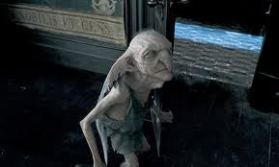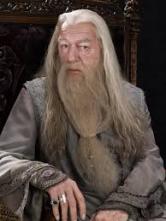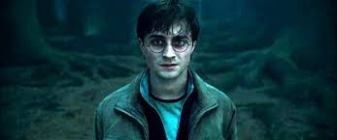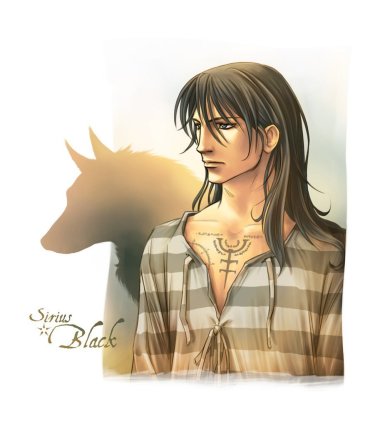Fair warning: This post presents some hard, cold truths about my absolute favourite character in the Harry Potter series and is the result of a lot of thinking and slow coming to terms with artistic decisions. As a result it might get rather, er, emotional.
Herein I will discuss why Sirius Black had to die.
When Sirius arched through the mysterious veil in the Department of Mysteries, it was no accident. Bellatrix’s jet of red light had been coming on for all of the fifth book, beginning its slow journey with the headquartering of the Order in Grimmauld Place. Sirius had all but been pronounced dead by the middle of Order of the Phoenix when he grimly tells Harry that he is ‘less like James’ than he thought. It’s the first sign of disagreement between the two, and it’s one that is never addressed in the course of the book.
Sirius’s death was plotted, planned and very carefully orchestrated. In short, it was cold-blooded murder. Who was responsible for his demise? I have narrowed the list down to a few suspects, and we’ll examine their motives and methods in this post. Of course, I have my own very strong opinion on who dun it. Let’s see if you’re convinced at the close.
1) Bellatrix Lestrange or, Keeping it in the family
I’ll deal with the most obvious suspect first.
Who: Bellatrix Lestrange, wanted criminal high in the Dark Lord’s favour. Blood relative to the deceased (first cousin). Mentally unstable with a long history of violence.
Why: As a trusted lieutenant of the Dark Lord, Bellatrix is known to have had little qualm in dispatching with enemy soldiers (witness the Longbottoms). Added to the fact that they were on opposing sides of the burgeoning war, Bellatrix quite possibly might have hated Sirius more because of their blood connection. We see in Deathly Hallows that she takes the marriage of Tonks and Lupin rather hard, swearing to kill them herself in order to avenge this stain upon the family. Certainly Sirius’s lifestyle choices wouldn’t have sat well with her.
How: In the Department of Mysteries, Bellatrix duels Sirius before the Veil and fires the spell that sends him arching through it.
Conclusion: Bellatrix has some strong evidence pointing against her. However, I would argue that she is merely the instrument of murder, not the one who made his fate inevitable. In the context of the book, it could very easily have been any other Death Eater (I think) who killed Sirius. Rowling, I believe, used Bellatrix because she needed to illustrate what a ruthless and skilled witch she was and taking down Harry’s beloved and dangerous godfather certainly cements her in the top rank of villains.
2) Kreacher the House Elf or, The Butler Did It 
Who: Slave to the Black family, Kreacher is the house elf who malingers in 12, Grimmauld Place, sullenly muttering under his breath about the worthlessness of his master. Kreacher has picked up certain conservative, pureblood attitudes from his mad mistress (Mrs. Black), and hence disapproves heartily of both Sirius’s presence in the house as well as the use to which he has put his beloved home.
Why: As stated, Kreacher loathed Sirius. Sirius in turn loathed Kreacher. Neither of them seemed to make any efforts to make life easier for the other, with Kreacher only stepping up his insults and insinuations in Sirius’s presence and the wizard making no effort to conceal his distaste for the elf. Each is the living embodiment of the other’s worst memories. I would argue that Sirius is a constant reminder of Regulus to Kreacher, a reminder of the elf’s ‘worst’ failure. It’s no secret that they would both have gladly seen the other dead.
How: Kreacher fed information to the Malfoys. Though unable to give away key facts such as the location of the Order’s headquarters or their plans, he did provide the Dark Lord a delectable tidbit: that Sirius was the person closest to Harry. This enabled Voldemort to lay the trap that led to his demise.
Conclusion: By having Sirius meet his end at the hands of Kreacher, Rowling illustrates a telling point in the series: never underestimate anyone, even the lowest of the low. This is an old theme in fantasy fiction, well borne out by Frodo and Sam in Lord of the Rings. Kreacher, in this case, functions as an indicator of the strength of malice, a Gollum-like trait that leads, eventually, to destruction and furtherance of the plot.
Kreacher certainly did play a large role in the eventual death of Sirius Black. Without him, the plan to lure Harry into the Ministry might never have succeeded. I somehow cannot imagine Harry taking the same reckless steps to save, say, Tonks or Kingsley, who are arguably more immediately ‘useful’ Order members that Voldemort would certainly have wanted out of the way. Kreacher, however, is merely an enabler (an important one, of course), an accessory without whose help Sirius might not have died at the precise moment at which he eventually did. He was not, however, the murderer.
3) Albus Dumbledore, or, the Foolishness of the Wise
 Who: Headmaster of Hogwarts, dethroned (at the time of the events) Supreme Mugwump of the International Confederation of Wizards, dethroned (at the time of the events) Chief Warlock of the Wizengamot, proud denizen of a Chocolate Frog card.
Who: Headmaster of Hogwarts, dethroned (at the time of the events) Supreme Mugwump of the International Confederation of Wizards, dethroned (at the time of the events) Chief Warlock of the Wizengamot, proud denizen of a Chocolate Frog card.
Why: Dumbledore is a master manipulator, as well evidenced by the revelations in Deathly Hallows. He claims, during his talk with a distraught Harry, that he had ‘forgotten’ the effect of confinement on active, brave young men like Sirius. He pleads guilty to the folly of ‘age’, but I’m really not buying it. Dumbledore is too smart to have not known what kind of effect confinement would have on Sirius, nor was he blind to the hatred that festered between him and Snape. Furthermore, Dumbledore would have had another reason for wanting Sirius out of the way; he was the final obstacle between himself and Harry. As long as Sirius was around, Harry would never turn to Dumbledore with the sort of all-encompassing trust that he displays in Half Blood Prince. With the ‘closest thing to a parent’ gone, Dumbledore becomes Harry’s first choice of mentor.
How: As stated, all Dumbledore had to do (and did) was to keep Sirius under house arrest in Grimmauld Place. This was ostensibly for his own good, but it did drive Sirius more than a little mad. The resentment built up during these months manifests itself in Sirius’s alcoholism and his disagreements with Harry. Stifling an energetic, brilliant wizard surely did its bit in propelling Sirius out of that door and towards recklessness.
Conclusion: Dumbledore created an atmosphere of resentment and pushed Sirius’s reckless nature to its limits with his confining strictures. There is no doubt that he did have a bit of a vested interest in getting rid of Sirius, and especially after Deathly Hallows I can’t quite trust his apologies and protests of ‘forgetfulness’. Dumbledore had a plan all along, and I think Sirius would have been a serious encumbrance to its fulfilment. Do you honestly think Harry would have been allowed to go off and be suicidal if Sirius had been around? He would have done whatever it took to keep him from throwing his life away, and might even have been successful. Without Sirius around, Harry had no really pushy, energetic soul to wean him from Dumbledore’s chosen track.
While Dumbledore would certainly have welcomed Sirius’s demise and didn’t help with his house arrest regulations, I think we can’t peg him as anything more than a mastermind, not the actual murderer. He is, if anything, an accomplice, a master-abetter. He did nothing to prevent it from happening, but no, he is not the murderer. He closed his eyes to it (thus allowing it to happen), much as he closed his eyes to Grindelwald’s delinquency. It is, really, in keeping with Dumbledore’s weakness to do nothing and hence wreak even greater harm.
4) Harry Potter, or, the Boy Who Lived because others died 
Who: Harry James Potter, son of James and Lily Potter, Chosen One, Gryffindor Quidditch Team Seeker, Boy Who Lived (Come to Die) and godson of Sirius Black. Has a history of causing death to innocent bystanders (Cedric Diggory, Lily Potter).
Why: As Joseph Campbell established decades ago, every Hero undertakes a Journey that includes, usually, the loss of a mentor figure. The mentor must make way for the Hero; growth can only be achieved when the Hero undergoes this loss and learns to strike out on his own. Luke Skywalker lost Obi Wan, Rand loses Moiraine, Frodo loses Gandalf…the list goes on and on. Sirius is, at this point, the closest mentor figure Harry has (as established, he is not yet fully reliant on Dumbledore) and needs to be sacrificed in order for him to grow and stumble onward without protection.
How: Harry is pretty much the reason Sirius was where he was when he died. Using his love for his godfather, Voldemort lured our Hero and his friends to the Department of Mysteries and then sprung the trap that resulted in Bellatrix killing her cousin. If Harry had not fallen for this illusion, if he had practiced Occlumency like he should have, Sirius might never have landed up at the Department at all.
Conclusion: I do think Harry is a very strong candidate for the top position, if only because of the role Sirius plays in his life. The mentor figure must go, usually, and the moment Harry wrote to him in Goblet of Fire talking about his scar, the godfather’s chances of survival dipped drastically.
But I really don’t want to blame Harry. The poor boy gives himself enough heartache anyway when it comes to friends dying (and Voldemort doesn’t help). And really, any mentor figure Harry chose would have perished; even Dumbledore and Remus don’t survive the onslaught of Literary Convention.
There was something particular to Sirius himself that made his death inevitable, and that’s why I think this wasn’t really a murder case. It was art-driven suicide.
5) Sirius Black, or, the Man Who Had to Die 
Who: Sirius Black, last surviving male member of the House of Black (Toujours Pur, please). Member of the infamous ‘Marauder’ gang that terrorized Hogwarts in its time, member of the Order of Phoenix, soldier in both the First and Second Wars against Voldemort, fugitive from Wizarding law.
Why: It took me a while to come to terms with this, but if you have a character like Sirius, you really can’t help but kill him off. Look at him: he’s a firebrand. He’s a rebel. He’s amazingly defiant. He cannot be contained by rules. You need people like this in war situations, to inspire others, to function as suicidally-protective forces for more passive characters. But what would you do with them in peace situations? Can you honestly imagine him marrying and living happily ever after? Sirius was wrecked already by twelve years in Azkaban, to get him to embrace conventional domesticity, as every other character in the Potter books does at the close, would have been impossible. Rowling had to tie her series up neatly, and I somehow don’t see a half-mad Sirius fitting in well here.
Not only was Sirius as a character untenable in a peaceful wizarding world, but I sincerely doubt the hunt for the Horcruxes and Harry’s final suicidal stand would have been at all possible if his godfather were around. It’s one thing to dissuade Lupin from joining them on the mad hunt; Sirius was a much more aggressive character and would probably not have been thrown off so easily. Would the hunt have panned out the way it did if Sirius has come along? The power of friendship would not have been so wonderfully demonstrated if it were not just the Trio (the reason Ginny couldn’t have joined either) and Harry and company had to literally be on their own and rudderless; the addition of a parent figure would have undercut the weakness of their position and the pure faith and friendship their rather hopeless-seeming quest exemplified. As a more experienced wizard, Sirius’s presence would have strengthened their group and thus, paradoxically, weakened them as a narrative unit.
And finally, Harry’s suicide. There is no way in hell Sirius would have stood aside for this. It’s one thing to walk away from Ron and Hermione, but Sirius, who had literally no one else to live for (unless you ship Remus-Sirius, which I do), would never have let his one anchor to sanity and love walk away to die, even if it were for the good of the wizarding world. Similarly, I don’t think Harry would have been able to walk away from Sirius, who would, by this point, have probably become even more of a parent figure for him.
Harry was able to make the sacrifice he did because he did not, at this point in the series, have anyone to really live for. He can even imagine Ginny marrying someone else, much as it pains him. Everyone else in the books has a future without him, no matter how hard. Sirius? No. Way.
To make Harry a hero, to save the wizarding world, Sirius Black had to die. It’s the sad truth.
And it’s why, to me, he’s the biggest hero of them all.
Case Closed.
Interesting. I never thought much about what would have happened had Sirius lived. I really don’t want to believe that Dumbledore willfully stood by and allowed Sirius to go mad in his confinement, but you make a compelling case. One of the things I love about this series is its humanity: none of the characters are perfectly good or perfectly evil (with the exception, perhaps, of Lord Voldemort, who is pretty much the embodiment of evil.) Everyone has their flaws, some of them trivial, some of them serious.
i love how you write about sirius! I feel you.